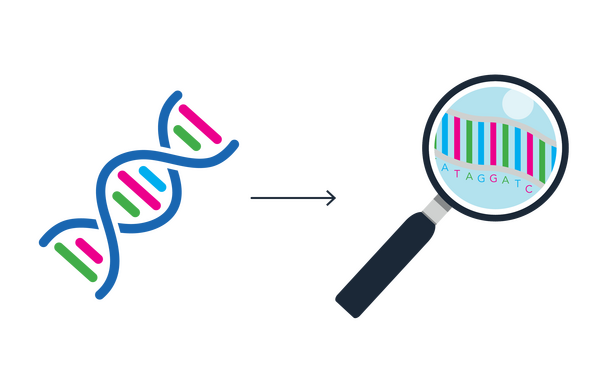Genomics 101: What is a variant of uncertain significance?
By Florence Cornish on
What is a gene?
Before we dive into variants of uncertain significance, it is first useful to understand the term ‘gene’.
A gene is a section of DNA that contains a specific instruction about how we develop, function and grow.
Humans have around 20,000 genes altogether, and these make up the complete set of instructions we need to survive.
So then, what do we mean by gene variant?
A gene variant, also known as a genetic change, is when a change occurs in the sequence of someone’s DNA.
Genes contain instructions which are spelled out in a specific way, so that our body can read them and make sense of the instruction.
A variant occurs when there is a change in how this instruction is spelled out, which can cause our body to interpret the gene differently.
Can you give an example?
Sure! There are lots of examples of gene variants, in fact, gene variants are often responsible for the differences we see between people.
Variation in physical appearance, such as eye colour or skin tone, as well as some behaviours, can be partly accounted for by different gene variants.
But, can gene variants affect our health?
Whilst most gene variants don’t have any effect on the body, some gene variants can cause problems for our health.
For example, cystic fibrosis is a rare condition caused by an inherited gene variant.
The condition is caused by changes in a gene called CFTR, which provides instructions for a protein that helps to keep our mucus thin and free flowing.
When this protein doesn’t function as expected, mucus becomes much thicker, in turn causing the symptoms such as wheezing, coughing, and ongoing chest infections.
So then, how do we find these gene variants?
When trying to find a diagnosis for someone who has a rare condition, these gene variants are exactly what we’re looking for.
We do this using genetic or genomic testing, which means looking at an individual gene, a series of genes, or even someone’s entire genetic code through whole genome sequencing.
These aim to check whether someone has a certain gene variant which might be causing their condition.
What do we mean by ‘variant of uncertain significance’?
When doing a genomic test, we might find a gene variant that we are sure is causing the condition. This would result in a diagnosis.
On the other end of the spectrum, we might notice variants that don’t have any effect, which we can rule out as being a cause.
A variant of uncertain significance is a variant that sits in the grey area. In other words, it could be causing the condition, but it also might not be, and we don’t know for sure how significant it is.
How do we know if a variant is causing a condition?
When we find a variant through genetic or genomic testing, there will be a team of scientists who try to determine its effect.
They will use lots of pieces of information to do this, for example looking at whether the variant has been recorded in anyone else before, whether we might be able to predict its effect, or how the variant might result in a condition.
The process can take a long time, but it is important to make sure we have the most accurate information possible.
How common are variants of uncertain significance?
Variants of uncertain significance are relatively common when we do genomic testing.
They occur when have a good knowledge of a gene, but don’t know quite enough to be sure one way or the other. This usually happens when we’re doing tests that look at lots or all of someone’s genes, like whole genome sequencing.
Can we find the significance of these variants?
Understanding variants of uncertain significance is really important, as it could potentially lead to diagnoses for more people.
To ‘re-classify’ variants as causing a condition, it takes a lot of time to gather information and carry out research. This might involve looking to see if other people have the variant, and whether they have a similar pattern of symptoms.
Conversely, it might involve looking for the variant in people who don’t have the rare condition, so we can rule it out as a cause.
Either way, re-classifying variants of uncertain significance often takes time, as scientists and clinicians to need build a bigger picture about the variant in order to know for sure.
And finally...
Prefer to listen? Check out our Genomics 101 podcast: What is a variant of uncertain significance?
You can also learn more about genomics by reading our other explainer blogs.

